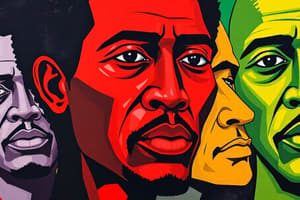Podcast
Questions and Answers
What is Nationalism?
What is Nationalism?
Pride in one's country.
What is Imperialism?
What is Imperialism?
A policy in which a strong nation seeks to dominate other countries politically, socially, and economically.
What is Communism?
What is Communism?
An economic system advanced by Karl Marx advocating class struggle.
What is Fascism?
What is Fascism?
Who is Ghandi?
Who is Ghandi?
Who is Mao Zedong?
Who is Mao Zedong?
Who is Deng Xiaoping?
Who is Deng Xiaoping?
What was the Great Leap Forward?
What was the Great Leap Forward?
What was the Cultural Revolution?
What was the Cultural Revolution?
Who were the Red Guards?
Who were the Red Guards?
What is Apartheid?
What is Apartheid?
What was WW1?
What was WW1?
What is the League of Nations?
What is the League of Nations?
Why did the League of Nations fail?
Why did the League of Nations fail?
What is NATO?
What is NATO?
What was the Holocaust?
What was the Holocaust?
What was the Tokugawa Shogunate?
What was the Tokugawa Shogunate?
What was the Meiji Restoration?
What was the Meiji Restoration?
Who is Fidel Castro?
Who is Fidel Castro?
What was the Cold War?
What was the Cold War?
What was the Opium War?
What was the Opium War?
What was the Treaty of Nanjing?
What was the Treaty of Nanjing?
What was the Treaty of Versailles?
What was the Treaty of Versailles?
Who is Kemal Ataturk?
Who is Kemal Ataturk?
Who are Marx and Engels?
Who are Marx and Engels?
What is Laissez-faire?
What is Laissez-faire?
What was the Nazi-Soviet Non-Aggression Pact?
What was the Nazi-Soviet Non-Aggression Pact?
Who was Hitler?
Who was Hitler?
Who was Stalin?
Who was Stalin?
Who was Lenin?
Who was Lenin?
What happened in Hiroshima and Nagasaki?
What happened in Hiroshima and Nagasaki?
What was the arms race?
What was the arms race?
What is Appeasement?
What is Appeasement?
What is Nonalignment?
What is Nonalignment?
What is Globalization?
What is Globalization?
What is Militarism?
What is Militarism?
What is NAFTA?
What is NAFTA?
Flashcards are hidden until you start studying
Study Notes
Nationalism and Imperialism
- Nationalism: Strong pride and loyalty towards one's own country.
- Imperialism: Policy wherein strong nations dominate weaker countries politically, socially, and economically.
Political Ideologies
- Communism: Economic system developed by Karl Marx, centered on class struggle, public ownership of property, and equal distribution of work and resources.
- Fascism: Authoritarian system characterized by dictatorial power, nationalism, and imperialism.
Key Historical Figures
- Gandhi: Leader of the Indian National Congress, notable for advocating non-violent protests for Indian independence.
- Mao Zedong: Chinese Communist leader from 1949 to 1976, pivotal in shaping modern China.
- Deng Xiaoping: Successor to Mao, introduced capitalist elements to boost China's economy.
- Fidel Castro: Communist revolutionary who governed Cuba.
Significant Events and Policies
- Great Leap Forward: Mao's initiative to combine farms into communes; ended after two years due to lack of worker incentives and widespread failure.
- Cultural Revolution: Chaotic campaign initiated by Mao aimed at purging dissent within the Communist Party and instilling revolutionary values in youth.
- Red Guards: Youth groups who enforced Mao's Cultural Revolution, often resorting to violence against perceived enemies.
Apartheid and Global Conflicts
- Apartheid: System of institutionalized racial segregation and discrimination enforced in South Africa.
- World War I: Conflict between the Allies and Central Powers primarily fought in Europe.
- League of Nations: International organization established post-WWI to promote peace; failed due to unanimous voting requirement and U.S. non-participation.
Post-War Organizations
- NATO: Military alliance formed after WWII to deter future conflicts.
- Cold War: Prolonged geopolitical tension between the United States and the Soviet Union post-1945, rooted in opposing ideologies.
Conflict and Treaties
- Holocaust: Genocide during WWII targeting Jews and other groups by the Nazi regime.
- Opium War: (1839-1842) Conflict between Britain and China over the opium trade, leading to China's significant territorial and economic concessions.
- Treaty of Nanjing: 1842 agreement that ended the Opium War and established unequal treaties favoring Britain.
- Treaty of Versailles: Ended WWI, imposed punitive reparations on Germany.
Major Leaders and Philosophies
- Kemal Ataturk: Nationalist leader who modernized and secularized Turkey.
- Marx and Engels: Foundational figures in the establishment of communist ideology.
- Laissez-faire: Economic principle advocating minimal government intervention in capitalism.
Cold War Dynamics
- Nazi-Soviet Non-Aggression Pact: Agreement to divide Poland and avoid conflict between Germany and the Soviet Union.
- Stalin: Leader who succeeded Lenin, known for purging opposition and establishing a totalitarian regime.
Warfare and Weaponry
- Hiroshima and Nagasaki: Cities targeted by atomic bombs dropped by the U.S. to expedite the end of WWII.
- Arms Race: Competition for military superiority between the U.S. and Soviet Union during the Cold War.
Global Trends
- Appeasement: Policy of making concessions to avoid conflict, exemplified prior to WWII.
- Nonalignment: Strategy adopted by some nations to maintain independence from both Cold War power blocs.
- Globalization: Processes that foster worldwide integration and connectivity.
- Militarism: Ideology emphasizing military readiness and the glorification of armed forces.
Economic Agreements
- NAFTA: North American Free Trade Agreement aiming to eliminate trade barriers between the U.S., Canada, and Mexico.
Studying That Suits You
Use AI to generate personalized quizzes and flashcards to suit your learning preferences.



